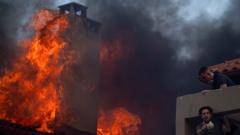A study published in JAMA suggests that the Los Angeles wildfires earlier this year led to approximately 440 indirect deaths, attributed to poor air quality and constrained healthcare access, far surpassing the known death toll of 31. The research underscores the broader implications of wildfire smoke on public health, noting that wildfires not only directly threaten lives but also contribute to long-term health issues such as lung and cardiovascular conditions.
Study Reveals Over 400 Indirect Deaths Linked to LA Wildfires

Study Reveals Over 400 Indirect Deaths Linked to LA Wildfires
A new study indicates that previously underreported deaths related to wildfires in Los Angeles may exceed 400, highlighting the urgent need for improved mortality tracking.
The findings, emerging amidst continuing wildfires across North America, call attention to the necessity for accurate tracking of both direct and indirect fatalities from climate-related disasters. The study's authors emphasize the importance of improved mortality surveillance and community support following such events.
As the Palisades and Eaton fires devastated Los Angeles in January, the research analyzed mortality patterns during that period, revealing nearly a 7% increase in deaths compared to previous years. Factors causing these fatalities include aggravated pre-existing health conditions and delays in essential medical treatment. The authors advocate for enhanced death measurement methods in light of the extensive impact of wildfires.
Meanwhile, another recent study focusing on the aftermath of the devastating Maui wildfires reported concerning health outcomes, with 22% of affected adults showing reduced lung function and half experiencing depression. Both studies highlight a growing recognition of the health ramifications following climate disasters, emphasizing the pressing need for sustained mental health support and clinical monitoring in fire-affected communities.
Wildfires, increasingly driven by climate change and extreme weather, have escalated in frequency and intensity, heightening risks for vulnerable populations including older adults, pregnant women, and those with chronic health issues. As wildfires rage on in various regions, it is crucial that public health officials and communities prioritize comprehensive strategies to mitigate the far-reaching implications of wildfire smoke and related health threats.
As the Palisades and Eaton fires devastated Los Angeles in January, the research analyzed mortality patterns during that period, revealing nearly a 7% increase in deaths compared to previous years. Factors causing these fatalities include aggravated pre-existing health conditions and delays in essential medical treatment. The authors advocate for enhanced death measurement methods in light of the extensive impact of wildfires.
Meanwhile, another recent study focusing on the aftermath of the devastating Maui wildfires reported concerning health outcomes, with 22% of affected adults showing reduced lung function and half experiencing depression. Both studies highlight a growing recognition of the health ramifications following climate disasters, emphasizing the pressing need for sustained mental health support and clinical monitoring in fire-affected communities.
Wildfires, increasingly driven by climate change and extreme weather, have escalated in frequency and intensity, heightening risks for vulnerable populations including older adults, pregnant women, and those with chronic health issues. As wildfires rage on in various regions, it is crucial that public health officials and communities prioritize comprehensive strategies to mitigate the far-reaching implications of wildfire smoke and related health threats.



















